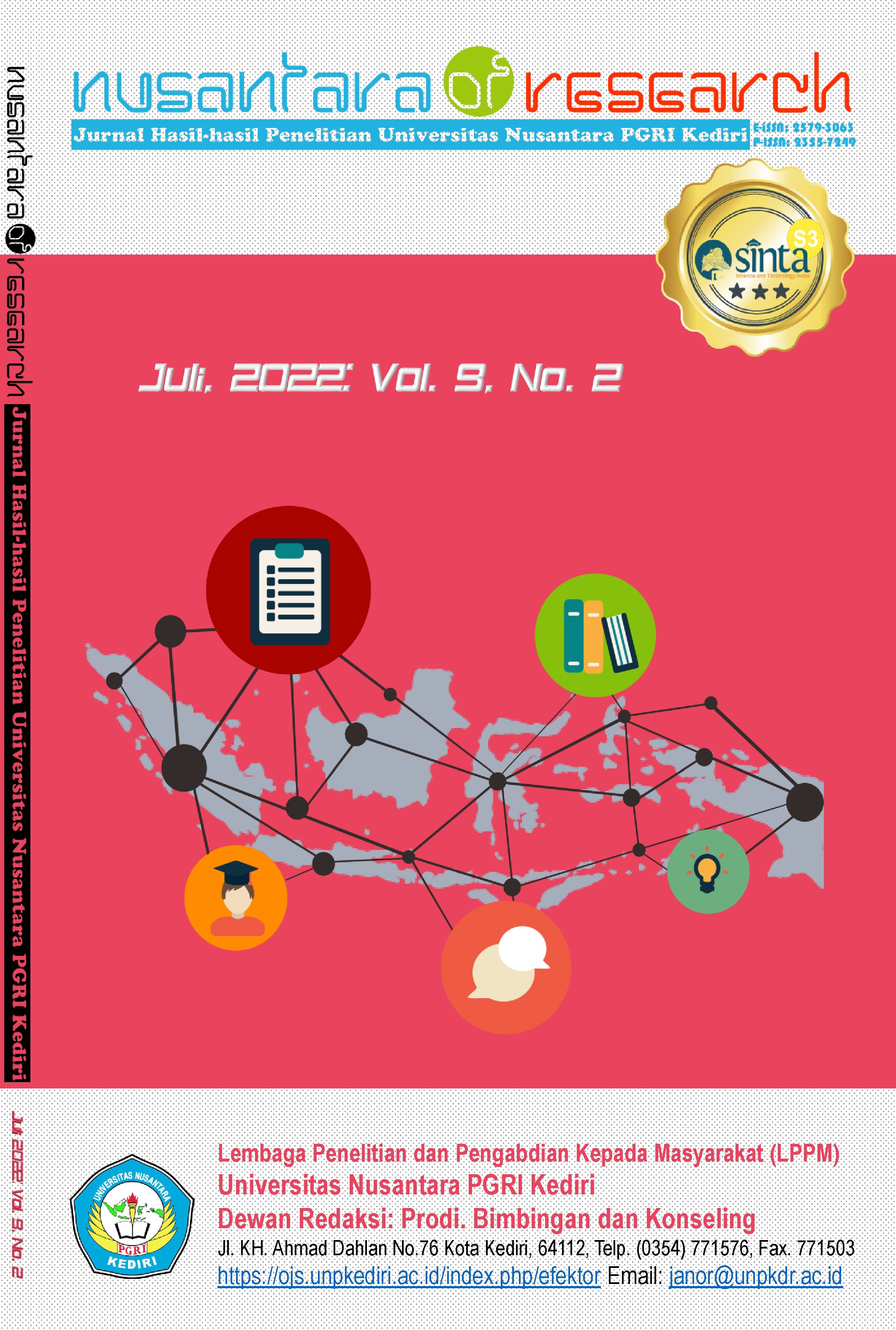Self-Regulation of Online Learning During the Covid-19 Pandemic
Main Article Content
Abstract
Self-regulation online learning (SRoL) is an internally proactive process for students to achieve online lectures during the Covid-19 pandemic. The purpose of this study was to describe the conditions of student lectures during the pandemic that changed their learning regulations and how the achievements were. This research method uses a descriptive quantitative approach by taking random sampling techniques on students who are active in online lectures. The description of the results of this study explains that the highest achievement of the response to self-regulation online learning (SRoL) includes six indicators, namely the first goal setting shows that 57.1% of students can make learning strategies well. The second indicator of environment structuring is how they manage the environment in a conducive way, which responded to 35.7%. The third indicator of task management was responded to by 7.1%, and the fourth indicator for time management explained that 32.9% of students could manage their time. The fifth is help-seeking, namely asking for help from friends 80.1% in doing assignments or needing understanding. The sixth self-evaluation was responded to by 44.3%, namely students evaluating learning outcomes with learning outcomes. This data shows that the achievement of lectures carried out with the online system does not guarantee maximum effort even though they can access lecture assignments more easily with the internet network.
Downloads
Article Details
Issue
Section
Authors who publish with this journal agree to the following terms:
- Copyright on any article is retained by the author(s).
- The author grants the journal, the right of first publication with the work simultaneously licensed under a Creative Commons Attribution License that allows others to share the work with an acknowledgment of the work’s authorship and initial publication in this journal.
- Authors are able to enter into separate, additional contractual arrangements for the non-exclusive distribution of the journal’s published version of the work (e.g., post it to an institutional repository or publish it in a book), with an acknowledgment of its initial publication in this journal.
- Authors are permitted and encouraged to post their work online (e.g., in institutional repositories or on their website) prior to and during the submission process, as it can lead to productive exchanges, as well as earlier and greater citation of published work.
- The article and any associated published material is distributed under the Creative Commons Attribution-ShareAlike 4.0 International License
How to Cite
References
Arbiyah, Nurul. Triatmoko, F.A.2016. Pengembangan Skala Regulasi Diri dalam Pembelajaran Daring (Self-Regulated online Learning Scale) pada mahasiswa. Universitas Indonesia. Min.I Set, Desernber 20 L6, hal, 20 • 32. Vol. 7 2016. ISSN 2086 - I 966
Harris, B.R., Reinhard, W.L., & Anthony, A.P. 2011. Strategies to promote self regulated learning in online envorironments. In Dettori, G & persico, D (Eds) Fostering selfregulated learning throught ICT, pp.122-144, Hershey: Information Science Reference.
Meiza, A., Hanifah., dkk. 2020. Analisis Regresi Ordinal untuk melihat Pengaruh Media Pembelajaran Daring terhadap Antusiasme Mahasiswa Era Pandemi Covid. UIN Sunan Gunung Jati Bandung.
Ningsih Made rai. D,. 2020. Pengaruh Metode Kuliah Online Terhadap Tingkat Pemahaman Materi Kuliah Hukum Investasi Pada Mahasiswa Universitas Teknologi Indonesia. Jurnal Pendidikan, Volume 21, Nomor 2, September 2020, 104-110.
Rahardja. U., dkk,. 2019. Motivasi Belajar Mahasiswa Terhadap Metode Pembelajaran Online iLearning+ Pada Perguruan Tinggi. Jurnal Ilmiah SISFOTENIKA Vol. 9, No. 2, 2019.
Rachmah, D. N. 2015. Regulasi Diri dalam Belajar pada Mahasiswa yang Memiliki Peran Banyak. JURNAL PSIKOLOGI, 61-77.
RaZumbrunn, S. 2011. Encouraging Self-Regulated Learning in the Classroom : A Review of the Literature. VIRGINIA AS: Metropolitan Educational Research Consortium (MERC), Virginia Commonwealth University.
Schunk, D. H., & Zimmennon, B. J. Eds. 1998. Self·regulated learning: From teaching to reflective practice. New York: The Guilford Press.
Schunk, 0. Ri Pinirich, P. R. & Meece, J. L.2008. Motivation in education: Theory.research. and applications. {3rd ed.). New Jersey: Pearson Merril/Prentice Hall.
Sukardi. 2012. Metodologi Penelitian Pendidikan: Kompetensi dan Praktiknya. Jakarta: Bumi aksara.
Sugiyono. 2010. Metode Penelitian Kuantitatif Kualitatif dan R&D. Bandung: Alfabeta.




